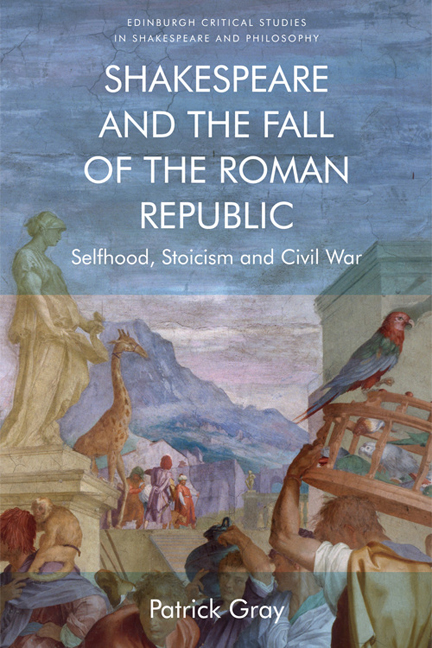Introduction: Shakespeare and the Vulnerable Self
Summary
It would generally be a decisive refutation of a moral philosophy to show that moral agency on its own account of the matter could never be socially embodied; and it also follows that we have not yet fully understood the claims of any moral philosophy until we have spelled out what its social embodiment would be.
Alasdair MacIntyre, After VirtueThe central claim of this study is that Shakespeare is deeply sceptical of neoclassical as well as classical glorification of the kind of personal autonomy Seneca describes as ‘constancy’. Shakespeare sees this pursuit of individual invulnerability, not only as a defining feature of Roman culture, but also as the most fundamental cause of the fall of the Roman Republic. The tragic protagonists of his Roman plays strive to transcend the limits of their own physical bodies, as well as their susceptibility to passions such as pity, grief and fear, and instead come crashing back down to earth. The ‘frailty’ that they hope to escape proves instead an intransigent given of the human condition. Unsuccessful efforts to achieve what Hannah Arendt calls ‘sovereignty’ backfire politically, as well. The untrammelled freedom from dependence on all others that Shakespeare's Romans idealise leaves no room for power-sharing between political rivals or for compromise across social classes, but instead leads them inexorably towards violence and, finally, civil war. As a thought-experiment, Shakespeare's Roman plays provide a prescient critique of the vision of the good that animates present-day political liberalism, the ethical ideal Quentin Skinner calls ‘neo-Roman liberty’.
For Peter Holbrook, ‘Shakespeare's poetic personality is deeply wedded to one particular value: individual freedom.’ ‘More than any other pre-Romantic writer,’ Holbrook argues, ‘Shakespeare is committed to fundamentally modern values: freedom, individuality, self-realization, authenticity.’ For Ewan Fernie, as well, ‘freedom’ is ‘a supreme Shakespearean value’. ‘But what is freedom,’ he asks, ‘and what does it mean to invoke it as a surpassing value in Shakespeare?’ ‘Shakespearean drama doesn't give us a smug and sentimental liberalism.’ Fernie sees an analogy between ‘the politics of Shakespearean form’ and ‘the classic statement of liberalism’, John Stuart Mill's treatise On Liberty, in which Mill speaks of ‘a necessary tension between individual freedom and social flourishing’.
- Type
- Chapter
- Information
- Shakespeare and the Fall of the Roman RepublicSelfhood, Stoicism and Civil War, pp. 1 - 46Publisher: Edinburgh University PressPrint publication year: 2018

